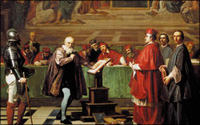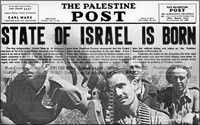 The 15th century saw the rise of what we call the Renaissance, which brought to Europe a new spirit in the arts, sciences, astronomy and philosophy – at the same time it brought a weakening of the hold that the Church had on the population.
The 15th century saw the rise of what we call the Renaissance, which brought to Europe a new spirit in the arts, sciences, astronomy and philosophy – at the same time it brought a weakening of the hold that the Church had on the population.
On one hand, the Church scored a great “triumph” in its expulsion of the Jews from Spain and forcing of hundreds of thousands of Jews to convert to Christianity. On the other hand, its “triumph” coincided with the beginning of the unraveling of the power of the Church. The modern Western world now began.
Galileo
The most famous event which characterizes this struggle is the plight of Galileo. He was a believing, devout Catholic and who subscribed to the theory of Copernicus that the Earth revolved around the sun – and not as the Church maintained that the sun revolved around the Earth. There were other discrepancies between the Church and the teachings of Galileo, so he was eventually tried for his heresies. The records of his trial are still extant.
Under the threat of torture – and later under the threat of excommunication – Galileo was forced to recant, to withdraw his statement that the world was round, the Earth revolved around the sun and that certain other views about the laws of gravity (that were the beginning to circulate and to which Newton would later develop). All of those post-medieval scientific ideas, which have since proven to be accurate, were held to be heretical by the Church.
In this respect, it is very important to realize one of the basic differences between Christianity – especially the Roman Catholic Church – and Judaism. There is no scientific fact regarding the natural world that in itself stands against any of the principles of Judaism. Therefore, the Jewish viewpoint toward these ideas was far more different than the viewpoint of the Church.
Moral Decadence
The Renaissance exposed the Church to a great deal of temptation which it was not able to withstand. It was a decadent time, a time of excesses and hedonism of the highest sort – excesses and hedonism the Church participated in.
The Church had the misfortune to have a series of Popes, Cardinals and Bishops who were not merely lacking in morals but were proactively immoral and amoral. For instance, the Borgias (also known as the Borjas or Borjia) Papal family was accused of many different crimes, including adultery, simony, theft, rape, bribery, incest and murder.
The Church earned enmity through its lifestyle. Having exacted and extorted high taxes, it had become extremely wealthy. Prominent church personages lived as princes… while the masses lived in squalor. The dichotomy was not lost on the latter and contributed to a new, general revulsion toward the organized Church.
The combination of the moral decadence of the Church plus the pleasure-ridden society of the times undermined the appeal of the Church and left it open to caricature, criticism, mockery – all of the things Martin Luther would say a century later when he began the Protestant Reformation.
Jews in the Renaissance
The Jews were very active in the Renaissance, especially in Italy where the movement was centered.
They were active in three main areas. First, they were physicians. The tradition of a Jewish doctor is very old. Almost all of the Italian dukes and noblemen had Jewish doctors, who influenced them in more than just medical matters.
The second area of great Jewish participation had to do with what is called the School of the Christian Hebraists. A large number of Christian scholars studied Hebrew. The Puritans were one result of this trend. When the Pilgrims arrived in the New World, they took a vote whether or not the official language should be Hebrew. There mere fact that such a proposal could be entertained is a statement as to the popularity of Hebrew in the non-Jewish world. And the Jews were naturally the conduit for that. They were hired by churches, scholars and universities to teach Hebrew, even though they could not hold official titles.
The Printing Press
The third area where Jews were very active in is the printing press. Until modern technology, the printing press was the single, greatest discovery in the history of the Western world. Its impact cannot be underestimated. It changed civilization. When Gutenberg’s bible was published in 1454 a new world opened. In effect, the world of the Middle Ages was ending and the modern world was being ushered in.
The ability to produce books cheaply en masse allowed the knowledge to reach anyone who wanted it. This almost single-handedly broke the hold of the Church in many ways, not the least of which was rampant illiteracy. The average person in Europe was even unable to acquire a book, no less read it.
The common denominator of all dictatorships is strict censorship. Since its inception, the printing press was the first thing that autocratic regimes outlawed or restricted. Today, instead of the printing press it is the internet. Whether it is China or any of the numerous Arab and Islamist dictatorships, it is anti-State activity. If they cannot stop it completely they at least try to limit it in whatever ways they can and punish those who are caught using it. Knowledge is an anti-State weapon. All dictatorships are built on keeping their people ignorant and docile.
For this reason, the Church attempted to control the printing press. It realized its advantages, but also its dangers. Therefore, for many centuries all printed books had to have the imprimatur of the Church. There were various ways to get around that, but that at least was the law. Censorship of Jewish books generally existed in Europe almost until the beginning of the 20th century.
The Church also required a license if a person wanted to run a printing press, and the way they set up the law Jews were forbidden to have licenses. Eventually, select Jews were able to attain printing licenses on their own. However, at first they were forbidden. As a result, an interesting arrangement developed whereby a non-Jew owned the license and a Jew ran the press. Many Jewish printing presses were in fact owned by non-Jews, who made a good profit.
This flurry of activity in Jewish books led to a second unique development: Hebrew books printed by Christians. Many non-Jewish printers hired Jews to carve out for them the Hebrew letters on wooden plates (later, plates would be metal). Demand for such books was so great that there was a period of time in Italy when the Hebrew market was almost as great as the non-Hebrew market.
Similarly, Christian Hebraists were at times hired by Jews to read, edit and proofread in Hebrew. Some even tried to print books in Hebrew on their own – sometimes accurately but sometimes with ludicrous errors. Some of these errors made their way into Jewish circles before they were identified and excised from the text.
No one pursued the printing press as much as the Jewish people. The Hebrew printing press really began in a number of places in Italy. There are different claimants as to which was the first Hebrew book printed. Similarly, there are various Italian towns that vie for the honor of having the first Hebrew press. The most famous is the little town of Soncino, which is why one of the earliest English-language book publishers called themselves Soncino Press.
David Reubeni
There is a Jewish tradition that the 10 Lost Tribes of Israel reside somewhere in a faraway country behind a legendary river called the Sambation (Sambatyon), an impassable natural barrier. According to legend, all week long it throws rocks and on the Sabbath it rests. At the times of the coming of the Messiah these “lost” tribes will return. The Messiah will quiet the river and bring back the remnants of the Lost Tribes trapped there.
There is a great deal of beauty and faith in the legend itself. However, the Talmud is less romantic. An opinion expressed there is that the Lost Tribes are not coming back as a whole.
In about 1520, there suddenly appeared a Jew in Christian Europe who called himself David Reubeni, David from the tribe of Reuben. He claimed that he came from the other side of the Sambation. He was able to ford the otherwise impassable river through knowledge of the Kabbalah. His kingdom had sent him as an emissary to the Jews and non-Jews of Europe.
He arrived with a great deal of pomp, including glittering clothes, a bejeweled sword, perfumed beard and with impressive flags and banners. He presented himself not as a beggar, but as a prince from the lost tribe beyond the Sambation, where his people lived an idyllic life and were prepared for the arrival of the Messiah. Indeed, he also intimated that the time of the Messiah was close at hand.
Many Jews believed in him. And he did a great deal for Jewish pride. He rode through the streets of the main cities of Europe dressed in a manner that no other Jew could dress in. He was accepted at the courts of kings. He even received an audience with the Pope.
However, his charade lasted only about 10 years. Then he overdid it. He began to believe his own rhetoric. What began as a prank turned into something serious. When he started to believe his own fantasy he opened himself up to destruction.
He took it upon himself to meet with the Christian rulers of Portugal to save the Jews, who had been expelled from Portugal in 1496, those staying behind being forced to convert to Christianity and exposed to the worst excesses of the Inquisition. During the next 30 years, the king and clergy in Portugal were more fanatical than even the rulers of Spain. David Reubeni visited the king of Portugal to explain to him the dilemma of the Jews. But the king promptly arrested him and threw him into the dungeon.
He was imprisoned 10 years, then disappeared. Some say he was burned at the stake in a large auto de fe in Lisbon in the 1540s. However, it is not certain. We don’t know what happened – other than the fact that he was never heard from again.
Solomon Molcho
The sincerity of David Reubeni can be questioned. Another Jew of similar influence, Solomon Molcho, was by all accounts sincere in every way.
Born a non-Jew, he converted to Judaism, which is incredible given that it was a time when pressures were causing Jews to convert to Christianity and the Inquisition was ravaging the Jewish communities in Spain and Portugal, where he originated. Cecil Roth cites figures that by the time the height of the Inquisition, more than 100,000 Jews had been executed in one fashion or another. Nevertheless, Solomon Molcho saw the glory of Judaism and converted to it.
He was person of great intellect and charisma. He said that he looked forward to his martyrdom on behalf of the Jewish religion. He did not claim to be the Messiah or even his messenger, but he said — somewhat elliptically – that his martyrdom would usher in the Messianic Era. It would be an expression of the messianic hope of the Jewish people, following which the Messiah would arrive.
The Christian world was happy to accommodate him and burned him at the stake.
Nevertheless, he had a profound effect on many people. His life has to be seen as part of the messianic fervor of the times, which itself was the fruit of the terrible sufferings the Jewish people were experiencing. When one can no longer believe in government and in the goodness of man, then longings for the supernatural redemption arise. These longings caused problems when the hopes were dashed.











